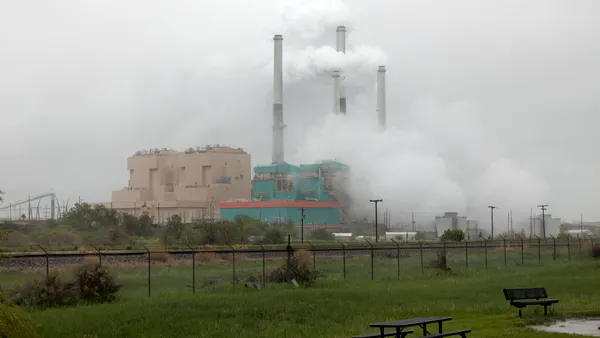Dive Brief:
- The New York City Council passed wide-ranging legislation to fight climate change known as the "Climate Mobilization Act," a package of seven bills that supporters said would help build a "Green New Deal for New York City." The legislation passed Thursday by a 45-2 vote, according to CityLab and multiple other reports.
- The bills' centerpiece requires buildings over 25,000 square feet cut climate emissions 40% by 2030 and more than 80% by 2050, which officials said is "the most ambitious energy efficiency legislation in the country." It also helps the city move toward shutting down its 24 natural gas plants in the city and replacing them with energy storage and renewable power, with a feasibility study to follow.
- "The Climate Mobilization Act is a down payment on the future of New York City — one that ensures we lead the way in the ever-growing fight against climate change," Council Member Costa Constantinides said in a statement before the bills passed.
Dive Insight:
This legislation represents perhaps the biggest and most ambitious city-level step to fight climate change, and leaders in New York City are urging their fellow major metropolitan areas to act. "We are on the precipice of climate disaster, and New York City is acting," City Council Speaker Corey Johnson said in a statement on Twitter after the bills passed. "I hope other cities follow suit."
The move to force large buildings in the city to cut emissions is an especially significant one, given that most emissions come from the building and transportation sectors. With numerous skyscrapers and other large developments in the city, cutting emissions there could be a major boon for the city's environment.
BREAKING: The @NYCCouncil, with the leadership of @Costa4NY, just passed the most aggressive municipal greenhouse gas emissions reduction legislation of any major US city.
— NYC Council Speaker Corey Johnson (@NYCSpeakerCoJo) April 18, 2019
We are on the precipice of climate disaster, and New York City is acting. I hope other cities follow suit. pic.twitter.com/jiKo18AOLt
Some advocates have noted the legislation is not perfect and may bleed into other issues the city faces around housing affordability.
In a statement, the Energy Efficiency for All New York (EEFA NY) Coalition noted that buildings with rent-controlled housing face less strict requirements, while some affordable housing properties are completely exempt. EEFA NY warned that discrepancy will "exacerbate the housing quality deficit in the long term for communities of color and low-income New Yorkers."
The group said many affordable housing developments are among the city's oldest buildings, which were built in less environmentally-conscious times and so do not live up to current standards. While EEFA NY said the legislation will create jobs, improve air quality and lower energy costs, it called for the New York legislature and the city to work to make it easier for affordable housing to hit emissions goals and help them recoup the costs of doing so.
The legislation also requires green roofs on certain large buildings and establishes requirements for smaller buildings to do the same; creates a Property Assessed Clean Energy (PACE) financing mechanism for commercial property owners; simplifies the applications and siting process for wind turbine installation across the city; and requires the Office of Alternative Energy to post and maintain links on its website on green roofs.
As cities battle the effects of climate change amid dire warnings from the United Nations and the federal government, the onus is increasingly on those cities to lead where national leaders have largely refused to do so.
But there might be a shift going on in people's mindset around climate change, with the national-level Green New Deal prompting debate in Congress, while contests and collaborations such as Bloomberg Philanthropies' American Cities Climate Challenge and the Bloomberg-backed American Cities Climate Challenge Renewables Accelerator are bringing city leaders together to share best practices and collaborate on ambitious goals.
Previously, some city leaders expressed concerns that their climate goals are too ambitious and have timelines that are too short to be realistic. But New York City Mayor Bill de Blasio is bullish on the city hitting its goals, noting in an interview with WNYC that "this is a moment for a much more, strong, aggressive approach," according to a transcript released by de Blasio's office.















